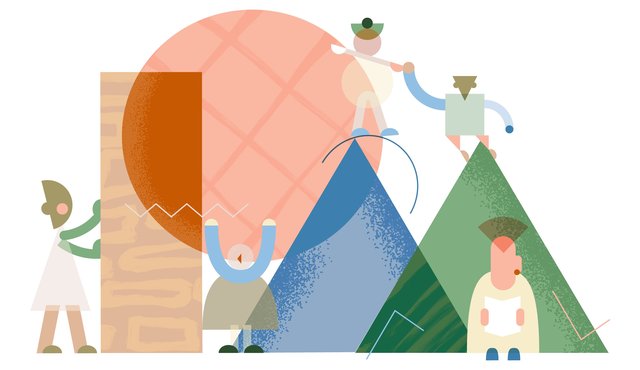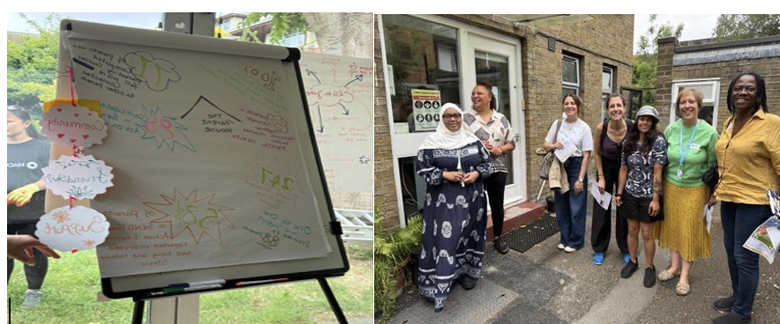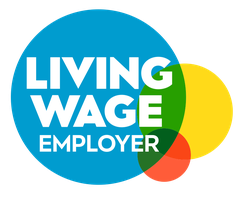The Heart of Place: Communities Giving and Growing

We spent two days together in June – on the 24th at the Collaborative Action Summit on Child Poverty hosted by Place Matters in Birmingham, which included representatives from community organisations, funders and governments. Our hope was ignited by examples of what is possible when those who hold positional power collaborate with those determined to improve lives in their communities. On the 26th we visited community organisations in the London Borough of Islington that are creating the soil for hope to take root and grow. These organisations proved Liz Weaver’s point that “local citizens in diverse neighbourhoods step up and care for each other in meaningful ways… [showing] courage and commitment in the face of adversity”.
In Islington, 38% of children live in poverty and 34% of older people are income deprived (cheek by jowl with some of the wealthiest people in the land), it is the second most densely populated local authority area in the country and has the least open space per person.16% of residents are disabled - the highest in London. So we thought this would be a place from which we and our colleagues could learn. Plus Kristina and Lela used to work there and had some contacts! We chose four organisations within walking distance from each other. We’re grateful to the people on the bustling streets who welcomed us into their neighbourhoods, and to the staff, residents, and volunteers in each place who welcomed our group so well.
The Parent House “works towards a future where all Islington families live full and happy lives” and provide free courses and workshops for Islington parents to build confidence and capability. Gina, who helped set up The Parent House 25 years ago, created the space for us to hear from four parents about how - through personal resilient and social networks and supports offered by The Parent House - they now better navigate caring for disabled children and systems that can make it hard to build strong social connections and good mental health. All of them are now volunteering to support other parents, actively shaping the community in their neighbourhood, and working in ways that make sense for their families. They shared how they have found friends and connections to different parts of the community through The Parent House. ‘I came here to start having a life again. I found people like me who speak my language, not the language of professionals.’ ‘My child was isolated and unable to face the world and I was terrified about the future. I went from being an exhausted parent with little hope to a passionate advocate and supporter, and now I can give back to others who need support.’ Gina said that she is constantly learning and adapting, as she handed round the delicious chocolate balls made by her son.

Kings Cross Good Neighbours Scheme is one of three run by Help on Your Doorstep, which works with residents to strengthen communities to do more for themselves and enable people to improve their health, wellbeing and life chances. We bought strawberry plants and mint from a member of the community and joined their seated exercise class. As we sang, moved, and caught each other’s eyes and saw each other’s joy, we were reminded that beyond the perceived differences of things like where we call home and what language we speak, we crave the same things: to be seen, to connect, and to laugh. Help on Your Doorstep started with the simple idea that no one was ‘hard to reach’ so taking services to people rather than waiting for people to come to them, prioritising the person over the ‘system’ could make a significant difference to people’s lives. They began knocking on every door within social housing and made an offer to try and support the needs the person behind the door felt were important. Isolation, mental health, poverty and disability remain key challenges for residents. A second key principle is that everyone can give. Good Neighbours Schemes bring people together to connect, give back and support others in ways that utilise their own skills and assets.

Claremont Project has an incredible programme of classes and projects aimed at being creative and healthy in body and mind, and at helping to develop real and lasting friendships. It really challenges traditional models of services for older people. Claremont Project has transformed a dark inaccessible Victorian Mission into a warm welcoming centre. Most activities are for people aged 55 and over and they have a social prescribing service and a low-cost psychotherapy service for people over 18. More than a fifth of issues presented to GPs are social (not medical) with isolation, anxiety and depression being most common. Claremont Project operates as a ‘club’ grounded in relationship and care. It currently has 900 members and the majority of provisions and classes are free. Given the increase in the elderly population, they are growing the support they provide to early identification and care for dementia. This is an area of growing need across most communities in the UK, and Claremont Project and other community organisations can play a critical role in supporting both residents as well as the health care system in identifying and caring for these needs. We saw salsa and other classes in action (but didn’t join in this time!) and had a guided tour of their amazing building showcasing their community poetry and art.

At Culpeper Community Garden we chatted to Mandy and one of their volunteers over lunch and heard about the challenges and joys of community members creating what has got to be one of the most beautiful and tranquil spaces that could possibly exist in any city. The Community Garden has 250 members, 160 volunteers, 46 individual plots for local people and welcomes a much larger number of people of multiple generations into the communal areas every day. The Garden offers many ways for people to feel grounded in their community and benefit from the healing effects of nature, from those who have been members for over 20 years tending to the garden through all the seasons, to recent refugees who can find support through Room to Heal, a programme that takes over the kitchen where the charity and up to 50 refugees cook and commune together. We got to experience the garden in moments of sun, torrential downpour, and the phases in between.

All the organisations we visited act as a trusted community hub providing safe, accessible spaces where people can connect. They are all supported by the wisdom and experience of thousands of residents and by Islington Giving, part of the London's Giving movement, which believes that ‘everyone can give’ to build places where people feel they belong and have what they need to live well. This idea came across strongly – people aren’t only recipients of services but are nurturing, building relationships and giving to each other. All the organisations prioritise locally rooted, relationship-based support, whether it is neighbours supporting neighbours, intergenerational arts programming, or parent-to-parent mentorship. They are building social capital, combating isolation, and reinforcing community resilience.
They demonstrate the value of trust-based models and long-term community engagement over transactional service delivery. They promote community agency, reduce dependence on statutory services, and create pathways to positive outcomes such as employment or civic participation.
With the challenges that are facing our communities, we saw how physical and emotional anchors in neighbourhoods can help communities weather change and uncertainty. These residents and organisations demonstrate that modest investments in community-led initiatives can yield powerful outcomes and create thriving places.
Authors:
Danya Pastuszek, Tamarack Institute for Community Engagement, Canada
Kristina Glenn, London’s Giving
Lela Kogbara & Emily Sun, Place Matters

